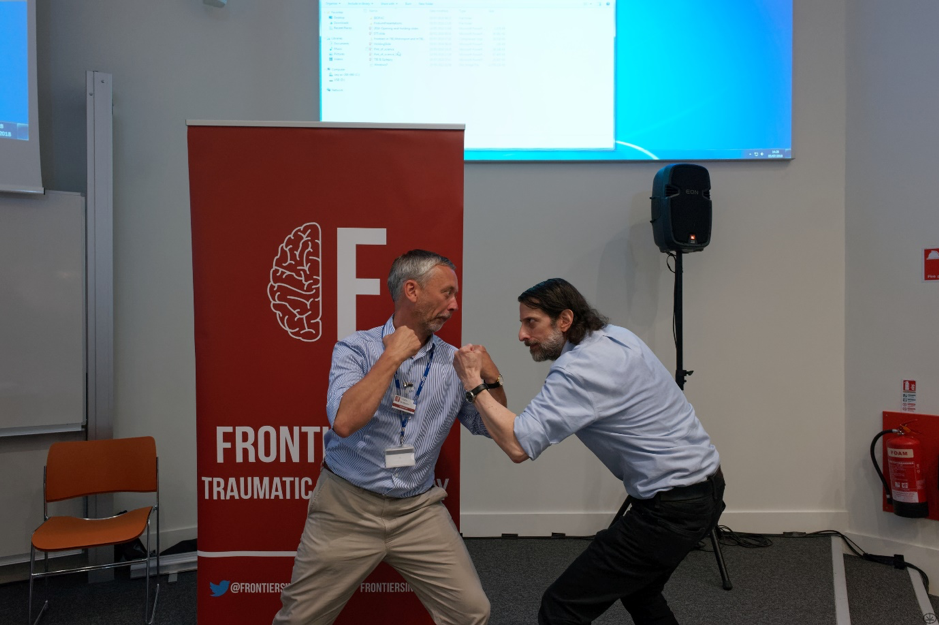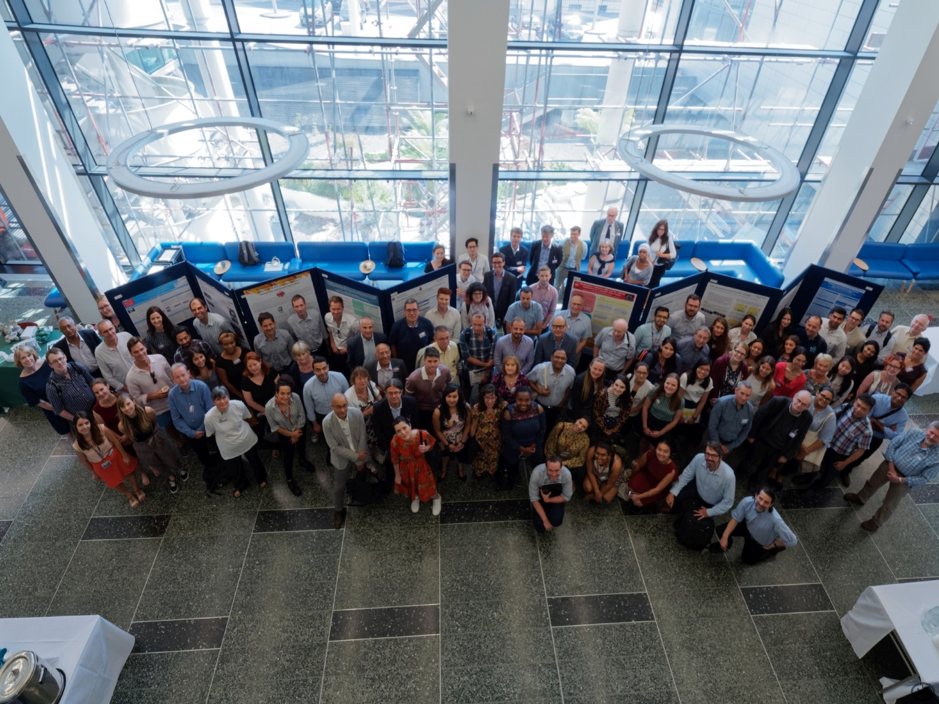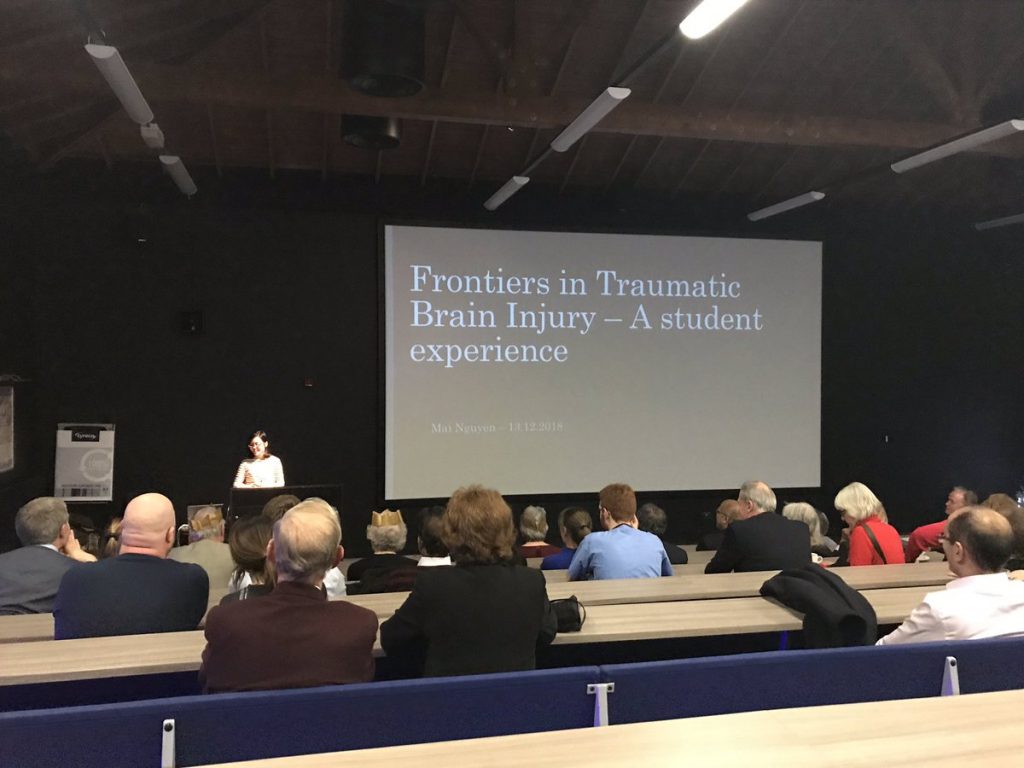On the 5th of July 2018, I was lucky to be able to attend Frontiers in Traumatic Brain Injury (FiTBI), a 2-day conference jointly held by St Mary’s and Imperial College London. This was the second year running for the conference, with attendees from various disciplines. There were a wide range of talks held throughout the day, heated debates, and many opportunities for networking!
The conference began with a welcome speech from the organizing committee, after which we went straight into lectures on neurological conditions after traumatic brain injury (TBI) such as epilepsy and sleep disorders, acute management of TBI, and mild TBI in motorsports. We reconvened after lunch in an interactive session: a debate on chronic traumatic encephalopathy (CTE), between Professor Steven Gentleman and Professor Lee Goldstein. CTE is a type of dementia, attributed to repeated trauma to the head, commonly seen in certain sports such as boxing or American football. Professor Goldstein discussed his latest work showing the correlation between head impact and the CTE brain pathology, independent of concussion symptoms. Professor Gentleman discussed the inconsistency in the diagnosis of CTE and how over-diagnosis could have a potential public health impact, i.e. through the reduction in children playing sports. Instead of an expected formality of scientific debate, the two professors had taken a light-hearted approach to the topic. The debate was pitched like a comedic stand-off between two nations, the UK and US. Professor Goldstein’s comical parody of Donald Trump was exceptional, which resonated well with academia’s view of the post-truth era. In a world where expert opinions are becoming overlooked and disregarded, and public education seems to be led by sensational headlines: being able to make light of the issues meant being able to challenge the absurdity of the situation, showing solidarity with the scientific community.

The first day ended with my favourite lecture, Dr Gregory Scott’s talk, ‘Grappling with consciousness’. Dr Scott has a background in computer science, and he spoke about our consciousness as if he were describing a hugely complex computer. Thinking of our brain processes as computational algorithms has always fascinated me, so I was immediately taken by his talk. Dr Scott explored the ‘critical brain’ hypothesis, a theory used in many technological systems. Criticality is defined as a ‘balanced cortex’, for example when the number of neurons loss equals number of neurons formed. The hypothesis is that when we’re conscious, the brain functions at criticality. Researchers assessed criticality hypothesis, based on the three criteria: information capacity, information transmission, and complexity. This has the potential to be applied in assessing a person’s consciousness, especially in disorders such as locked-in syndrome.
After a long day of lectures, we gathered for a gala dinner. I joined a table of neuroscientists as they discussed their experience in academia. We talked about a film being produced and directed by someone in the table. The inspiration for the film came from a conversation with a taxi driver. The scientist remembered having to explain to the driver how she had to secure her own funding for her research every year. The driver was surprised, having thought the cost for research projects would be paid by the university itself. She wanted to use short movie as an accessible art medium to resolve these misunderstandings and educate the public. Even though many of the dinner guests worked together or knew each other, everyone was so friendly towards me, and I felt very welcome. It was a rare opportunity for me to find out informally about life in academia.

After a good night rest, we came back next day for the second day of the conference, which was more focused on clinical aspects of neuroscience. After three talks on the clinical rehabilitation of patients with TBI, I headed to the session on neuropsychiatry and psychology. This is an area that I have considered as one of my career choices, so I was excited to learn from experts in the field. This session was delivered in the context of post-TBI psychiatric problems, and I found the lecture given by Dr Alan Carson on managing depression as a consequence of TBI was especially relevant to all health practitioners. He explained that mood changes are a common complaint after TBI, and those who aren’t specialists in the field tend to shy away from treating this, thinking it should only be left with the neurologist. With supporting data from multiple studies, Dr Carson suggested that this could often be well-managed in the community, with a combination of input from primary care and the community mental health team. The accessibility of treatment can make a massive difference to patients’ quality of life and aided their recovery post-injury.
On the day we were also joined by a representative from Leigh Day to hear about the legal aspect of head trauma. Then we got to hear the inspiring story from Ben Clench on his major TBI in Dominican Republic, and his journey in self-rehabilitation to recover his physical and cognitive ability after this major trauma.
As a medical student, this was my first experience of a specialty specific conference and I thoroughly enjoyed my two days at FiTBI. I had the chance to speak to many people from different backgrounds: neuroscientists, academic neurologists, psychologists and psychiatrists. The topics discussed were diverse, and it was refreshing to learn about novel research and applications in clinical practice. There are discussions ongoing about a third FiTBI and I hope the next conference will be even more successful. Meanwhile, you can follow the conference team on Twitter.
~~~~~~~~~~~~~~~~~~~

Mai Nguyen is a fourth year medical student, currently intercalating in MSc Clinical anatomy at Hull York Medical School. She has a keen interest in both neurology and neurosurgery. In her free time she likes to read books and cook or bake.
…

Many thanks to the FiTBI team for the opportunity to attend their conference, and to Mr George Spink for his support. Mai gave an oral presentation about her experience at the FiTBI conference at the Hull Medical Society meeting on the 13th of December 2018. Many thanks to the Society for this opportunity.

